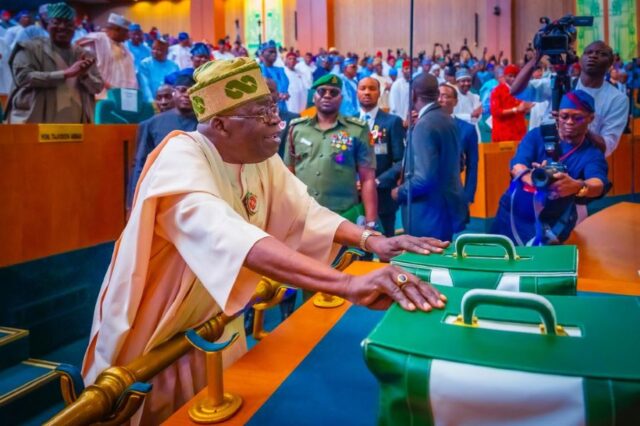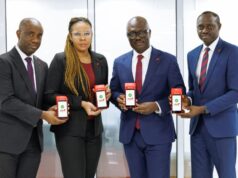Highlights of the 2025 Budget Allocations:
…Defence and Security: N4.91 trillion
…Infrastructure: N4.06 trillion
…Health: N2.48 trillion
…Education: N3.52 trillion
…The budget size reflects a 74.18% increase in nominal terms compared to the 2024 budget
WED DEC 18 2024-theGBJournal| President Bola Tinubu, during the plenary on Wednesday, presented a bold and audacious N47.9 trillion 2025 appropriation bill before the 10th National Assembly.
The budget size reflects a 74.18% increase in nominal terms compared to the 2024 budget.
The President also gave a breakdown of the proposal titled ”Budget of Restoration: Securing Peace, Rebuilding Prosperity”-outlining key areas of focus, and projecting that the budget will drive inflation down from its current level of 34.60% to 15% in 2025 while the exchange rate of the naira to the dollar will eventually settle at N1,500.
He is also hoping that Nigeria’s stagnating oil production level will reach 2.06 million barrels per day (mbpd) by the end of the budget cycle.
President Tinubu also stressed the importance of continuing with the economic renewal and institutional development, which began 18 months ago even as he acknowledged the difficulties and sacrifices involved but stressed the importance of continuing the reforms.
The 2025 Budget aims to consolidate key policies to restructure the economy, boost human capital development, increase trade and investments, enhance oil and gas production, and revitalize the manufacturing sector.
The budget allocations, also underscored the administration’s strategic priorities, particularly in advancing the Renewed Hope Agenda and achieving developmental objectives.
The Presidency believes the Nigerian economy is responding to stimulus, adding that Progress has been made in the past 18 months, including improvements in revenue collection, economic growth, and foreign reserves and a positive response to stimulus measures.
The 2025 budget targets 34.82 trillion naira in revenue and 47.90 trillion naira in government expenditure, with a focus on restoring macroeconomic stability, enhancing the business environment, fostering inclusive growth, and promoting human capital development.
The budget projects a deficit of N13 trillion, representing 3.89% of GDP, which exceeds the 3% threshold stipulated by the Fiscal Responsibility Act.
The 2025 Budget made significant funding increases for the military, paramilitary, and police forces to secure the nation, protect borders, and consolidate government control, with a focus on boosting morale and providing modern tools and technology.
The Renewed Hope Infrastructure Development Fund aims to accelerate investments in energy, transport, and public works, leveraging private capital to complete key projects like the Lagos-Calabar Coastal Highway and Sokoto-Badagry Highway.
In the 2025 Budget, there are record investments in education, healthcare, and social services, including 826.90 billion naira for educational infrastructure and 402 billion naira for health sector infrastructure, to strengthen primary healthcare systems and improve healthcare access.
The proposed spending plan has support for farmers with funding and inputs to increase agricultural production, central to the food security agenda, ensuring that every Nigerian can feed conveniently and no citizen goes to bed hungry.
How Realistic is the Budget?
First, analysts are skeptical about the revenue projections. Nigeria’s current oil production levels has seen several contrasting figures, and the acceptable level for now has been just 1.4mbpd.
President Tinubu in the 2025 budget is looking at 2.06mbpd. This is viewed as overly optimistic given the numerous unresolved challenges in the oil sector including vandalization, theft and rampant corruption.
Secondly, Financing the projected N13 trillion budget deficit through borrowing raises concerns about increasing the nation’s debt burden, and puts Debt sustainability further in doubt.
Thirdly, the assumed inflation and exchange rate of N1,500 per U.S. dollar may not align with current market realities, potentially affecting budget implementation.
Finally, many doubt the Federal Government’s implementation Capacity given previous experiences. It is not certain the capacity of the government and its agencies at ensuring proper oversight and minimizing corruption and waste as well as its capacity to execute projects efficiently.
While the 2025 appropriation bill outlines ambitious plans for Nigeria’s development, its realism is contingent upon achieving revenue targets, managing debt prudently, and effectively implementing allocated projects.
Addressing these challenges is crucial for the budget to positively impact the nation’s economy and citizens’ well-being.
X-@theGBJournal|Facebook-the Government and Business Journal|email:gbj@govbusinessjournal.com|govandbusinessj@gmail.com










